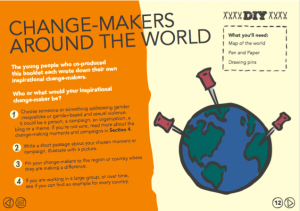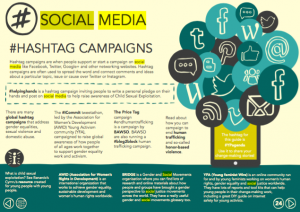The following lesson starters and activities might be useful in supporting key areas assessed for the Welsh Bacc Global Challenge, and may inform other classroom activities.
1. Lesson Starter
The task, “Change-Makers Around the World” (p.12) could be adapted as a lesson starter on Global Citizenship. Although it encourages students to focus on gender inequalities, or gender-based and sexual violence, any issue could be explored here (e.g. poverty, environment, human rights etc).
Extension task: The Stop-Start plates activity is another fun way to explore which issues (above) students themselves want to stop, and which issues they want to seek change on.
2. Raising Awareness
Section 4 (page 21) outlines 17 different ways in which young people in Wales and beyond have taken action on issues around the globe that have mattered to them.
a) Individually or in groups invite students two choose two contrasting modes of change (e.g. online petition V poetry, or school assembly V social media).
b) Next, encourage them to explore the strengths and weaknesses of each mode of change (e.g. target group reached; cost; successful outcome; skills needed; duration etc.)
There are postcards for each mode of change that can be downloaded from the www.agenda.wales website. Print a copy for each student and they can write the strengths and weaknesses they have identified on the back.
3. Research ideas for change
In groups or individually, select one mode of change and research this in more depth. On each page, there are links to begin this process (e.g. “Zines and comics” on p.23 provide links to the British Library’s collection of zines and graphic books and comics and on p.22, for “visual arts” there are links to websites showcasing activist art from around the world).
4. Putting Your Agenda into Action
From their research above, students can now pick one issue and one mode of change they would like to develop themselves. Section 6, “Putting Your Agenda into Action” (67-69) will support students in getting started. They invite students to reflect on:
a) How do you want to make a difference?
b) Research research research
c) Do you have a target audience?
d) Who can help you?
e) What’s your next move?
f) Keeping safe
g) Share your story
For students that need a bit of extra support, “three ways to get started” provides a more structured beginning, including links to the “Problem Tree” – an activity which helps students address not just the symptoms of a problem, but the power structures and inequalities that might be keeping a problem in place.
Approved Global Challenge Briefs
This brief includes dedicated resources for teachers and students to support design and delivery of the brief.




